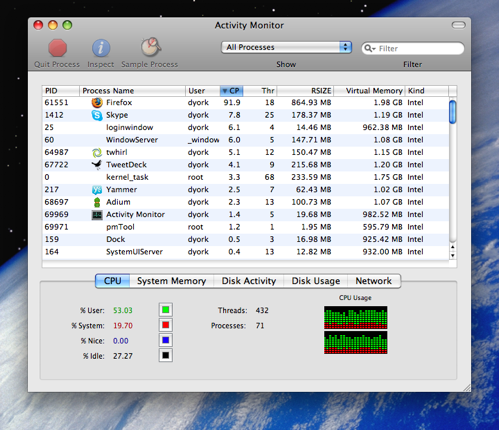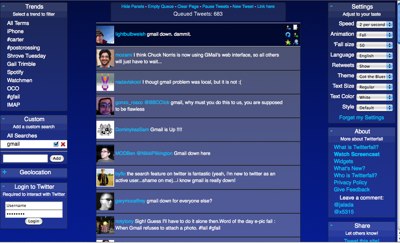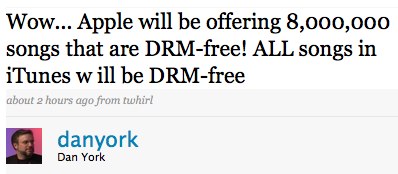After tweeting this in response to the MacWorld keynote today:
I had a couple of people ask me what DRM is all about and why it matters. So here’s my take on why DRM for music matters to me.
“DRM” is “Digital Rights Management” and if you want the gory details Wikipedia has a lengthy article but essentially DRM is “copy protection” in either software or hardware form that restricts your access to some digital media to only “authorized” devices/programs/computers/etc.
In the context of iTunes, it is the software that restricts you to only being able to play purchased music on specific computers or devices. When you buy a song from the iTunes Music Store (that has DRM), you can play that song only on computers that are authorized through your iTunes Music Store account. If I recall correctly, you are limited to 5 computers. If I have a new laptop or iPod or whatever, I have to authorize that device before it can download and play the music.
Proponents of DRM for digital music files, primarily the music companies, promote DRM as a way to ensure that artists (and those companies) get paid. Their fear is that without DRM people will just wildly copy music all over the place and the companies and the artists won’t be paid. And to a certain degree this is probably a valid fear.
The problem is that to a user DRM is often a royal pain-in-the-neck.
If I have a physical CD that I rip into online music files on my system, I can then move those files to any other server, to another disk, to another music player, to another laptop. There is no DRM and I can just move those digital files around the same way that I could a physical CD. It makes it trivial when you find that all your music is filling up one system and you want to move it to another and have music play out of that system instead of the one you are using now.
With DRM-restricted music, you can’t always do this. You have to authorize the new system. When I went to sync a new iPod to one of my systems, I had issues where it couldn’t download the music because it wasn’t authorized, etc., etc.
It makes me not want to buy music online.
Or, at least, DRM-restricted music. After having so many headaches recently with moving some music around when I was trying to free up room on a system, I decided that for a future purchase I was going to find DRM-free versions, even if it meant going out and purchasing the physical CD and ripping the CD into MP3s. Then, of course, I discovered the Amazon MP3 Downloads. Same basic prices as iTunes (cheaper in many cases) and without any DRM.
I own the digital music files and I can do with them whatever I want to do.
I can move them around. I can put them on different music players in my house…. basically everything that I can do with a physical media like a CD (or tape or album for those who remember such things). And yes, those who are unethical can of course copy them and give them to other people. But the point is that the digital media is now mine to do with as I wish exactly like the physical media is. I am in control.
I have therefore almost no incentive to purchase from the iTunes Music Store when I can get it from Amazon (unless, of course, the music is exclusively available in iTunes).
Steve Jobs wrote about this back in February 2007 when he wrote this:
The third alternative is to abolish DRMs entirely. Imagine a world where every online store sells DRM-free music encoded in open licensable formats. In such a world, any player can play music purchased from any store, and any store can sell music which is playable on all players. This is clearly the best alternative for consumers, and Apple would embrace it in a heartbeat. If the big four music companies would license Apple their music without the requirement that it be protected with a DRM, we would switch to selling only DRM-free music on our iTunes store. Every iPod ever made will play this DRM-free music.
Today, it seems, Apple has reached that state… they said that 8,000,000 songs will be available DRM-free now and all 10,000,000 songs will be available soon. You will need to pay a bit more (and that extra 30 cents probably goes to the record companies) but at least it is mine and I can play it wherever and whenever I want.
That is why I was so pleased with the Apple announcement.
If you enjoyed this post, please consider either subscribing to the RSS feed or following me on Twitter or identi.ca.
Technorati Tags:
apple, itunes, music, drm, amazon
 For those of us who have been around blogging for a while (crossing over the 9-year-mark myself in a few weeks), blo.gs was a site we all knew not only as a very creative domain name but also as one of the earliest “ping servers”. (Courtesy of today’s announcement, I learned of this great post that gives some of the early history of ping servers and services.)
For those of us who have been around blogging for a while (crossing over the 9-year-mark myself in a few weeks), blo.gs was a site we all knew not only as a very creative domain name but also as one of the earliest “ping servers”. (Courtesy of today’s announcement, I learned of this great post that gives some of the early history of ping servers and services.)


